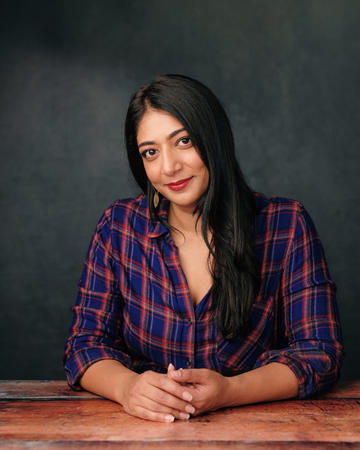Spotlight on Alumni: Dr Nussaibah Younis

In my debut novel Fundamentally – a dark comedy about a UN program to deradicalize ISIS brides – there is only one scene set in Oxford, and it’s an absolutely miserable one. I feel a bit guilty about that. Though I had ups and downs as a student, my time as a Modern History and English student at Merton College was amongst the happiest – and certainly the most formative – of my life.
Two authors I read as part of my English studies at Oxford have had a particularly outsized impact on my own writing. Virginia Woolf’s Mrs Dalloway taught me that great literature can be accessible, can include a conversational narrative voice, and can take great delight in the female gaze. It was a relief to discover not all literary works had to look like my least favourite Woolf novel, The Waves. Reading The Waves one summer during an underground commute to my internship felt like an unpleasant psychedelic experience, and one I did not wish to repeat – let alone inflict on anyone else with my own work.
My absolute hatred of Philip Roth, my special subject in my final year, also inspired me to include sharp, humorous, social and political critique in my fiction, but without the undergirding of his relentless misogyny. How good this could be, I would think wistfully, as I read yet another Roth novel in my peeling bathub on Holywell Street, if only he wasn’t such a heinous belittler of my gender.
I followed a circuitous route between the Oxford English Faculty and my first book deal. Initially, I wanted to do good in the world. (Don’t worry, it didn’t last.) I completed a Masters and PhD at Durham in International Affairs, then a post-doctoral fellowship at the Harvard Kennedy School’s Belfer Center. After that, I worked as a Senior Fellow at a think tank in Washington DC where I created a major program on US Iraq policy. What followed was several years in peacebuilding ‘on the ground,’ where I ran projects that sought to prevent a slide back into violence after ISIS had been defeated.
At one point, I was asked by the Iraqi government to design a program to deradicalize ISIS women. It got me thinking about my years as a religious teenager. When I was seventeen, I studied with the cleric Sheikh Anwar al-Awlaki, a Yemeni-American preacher who was smart, charming and inspiring. He later joined Al-Qaeda. I’d always wondered what I’d have done, in those naïve teenage years, had he tried to recruit me. Now I was faced with women who had been swept into ISIS, it felt like I was confronting another possible outcome of my life. What if that sliding-doors moment had gone another way?
I knew immediately that I had a great idea for a novel. My friends and colleagues had tried to persuade me to write a non-fiction book about deradicalization – and with my academic background, that would have been the obvious move. But I wanted to write something that could appeal to the widest possible audience, something that was actually enjoyable to read, that was funny, and emotional, and unafraid to delve into the trickiest and most human questions at the heart of the ISIS brides controversy.
I had also become quite disillusioned by the international aid industry and wanted to shed light on the nightmarish difficulties faced by people trying to ‘build peace’ in a foreign country. At times my work in peacebuilding had been farcical, had reached comic levels of absurdity, and it was ripe for satire. I love the way Evelyn Waugh skewers the war correspondent circus in Scoop, and the hilarious dragging of the BBC in W1A, and I wanted to do something similar for the UN.
Thus was born Fundamentally. It’s a dark comedy about Nadia, a heartbroken academic tasked with implementing a deradicalization program for ISIS brides. Working alongside a cast of fools and misfits, she becomes engrossed by a hilarious and foul-mouthed ISIS teen bride from East London and is forced to make an extreme choice.
The novel includes many serious themes, around faith, the search for meaning, broken family relationships, so I knew I’d need to work hard to centre the humour. I made the unusual decision to take a stand-up comedy course while I was writing the novel, testing out some of my material to make sure it was funny. When my now agent read my submission for the first time, she wrote to me saying she was gobsmacked by how much she’d laughed out loud in just the first few pages – that’s when I knew the stand-up course had been the right call! Once I’d signed with my agent, it was a whirlwind. I was very lucky to have eight UK publishers, four US publishers and ten production companies fight for the rights to the novel. The hardback will be released on 25th February 2025, and I am currently writing a pilot script for the first episode of the TV show.
And all thanks go to Oxford for giving me a love of Mrs Dalloway and a hatred of Philip Roth.



